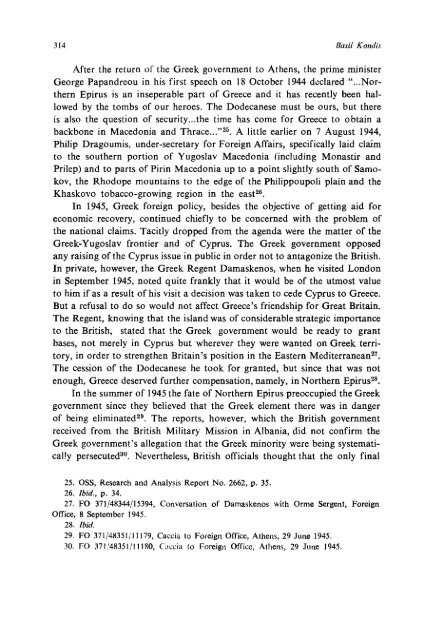2488-4976-1-SM
Create successful ePaper yourself
Turn your PDF publications into a flip-book with our unique Google optimized e-Paper software.
314 Basil Kondis<br />
After the return of the Greek government to Athens, the prime minister<br />
George Papandreou in his first speech on 18 October 1944 declared “...Northern<br />
Epirus is an inseperable part of Greece and it has recently been hallowed<br />
by the tombs of our heroes. The Dodecanese must be ours, but there<br />
is also the question of security...the time has come for Greece to obtain a<br />
backbone in Macedonia and Thrace...”25. A little earlier on 7 August 1944,<br />
Philip Dragoumis, under-secretary for Foreign Affairs, specifically laid claim<br />
to the southern portion of Yugoslav Macedonia (including Monastir and<br />
Prilep) and to parts of Pirin Macedonia up to a point slightly south of Samokov,<br />
the Rhodope mountains to the edge of the Philippoupoli plain and the<br />
Khaskovo tobacco-growing region in the east26.<br />
In 1945, Greek foreign policy, besides the objective of getting aid for<br />
economic recovery, continued chiefly to be concerned with the problem of<br />
the national claims. Tacitly dropped from the agenda were the matter of the<br />
Greek-Yugoslav frontier and of Cyprus. The Greek government opposed<br />
any raising of the Cyprus issue in public in order not to antagonize the British.<br />
In private, however, the Greek Regent Damaskenos, when he visited London<br />
in September 1945, noted quite frankly that it would be of the utmost value<br />
to him if as a result of his visit a decision was taken to cede Cyprus to Greece.<br />
But a refusal to do so would not affect Greece’s friendship for Great Britain.<br />
The Regent, knowing that the island was of considerable strategic importance<br />
to the British, stated that the Greek government would be ready to grant<br />
bases, not merely in Cyprus but wherever they were wanted on Greek territory,<br />
in order to strengthen Britain’s position in the Eastern Mediterranean27.<br />
The cession of the Dodecanese he took for granted, but since that was not<br />
enough, Greece deserved further compensation, namely, in Northern Epirus28.<br />
In the summer of 1945 the fate of Northern Epirus preoccupied the Greek<br />
government since they believed that the Greek element there was in danger<br />
of being eliminated29. The reports, however, which the British government<br />
received from the British Military Mission in Albania, did not confirm the<br />
Greek government’s allegation that the Greek minority were being systematically<br />
persecuted30. Nevertheless, British officials thought that the only final<br />
25. OSS, Research and Analysis Report No. 2662, p. 35.<br />
26. Ibid., p. 34.<br />
27. FO 371/48344/15394, Conversation of Damaskenos with Orme Sergent, Foreign<br />
Office, 8 September 1945.<br />
28. Ibid.<br />
29. FO 371/48351/11179, Caccia to Foreign Office, Athens, 29 June 1945.<br />
30. FO 371/48351/11180, Caccia to Foreign Office, Athens, 29 June 1945.


